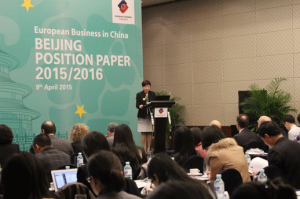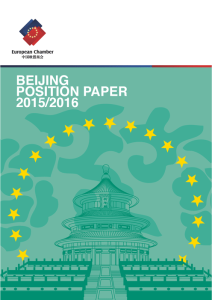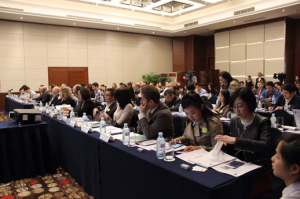 On 9th April, the European Chamber launched the Beijing Position Paper as a standalone publication for the first time: previously, local chapter papers had nestled in the back pages of the Chamber’s main Position Paper. It was decided that more prominence should be given to our local chapters in order to engage more effectively with local government authorities and to raise the specific concerns of our member companies operating in these locales. What follows is an overview of the executive summary of the European Business in China – Beijing Position Paper 2015/2016.
On 9th April, the European Chamber launched the Beijing Position Paper as a standalone publication for the first time: previously, local chapter papers had nestled in the back pages of the Chamber’s main Position Paper. It was decided that more prominence should be given to our local chapters in order to engage more effectively with local government authorities and to raise the specific concerns of our member companies operating in these locales. What follows is an overview of the executive summary of the European Business in China – Beijing Position Paper 2015/2016.
In 2004, the State Council of the People’s Republic of China approved the Beijing Municipal Commission of Development and Reform’s Beijing Master Plan 2004–2020 (Beijing Master Plan), a plan to establish Beijing as a global city by 2020. Ten years after its promulgation President Xi Jinping laid out four core functions that Beijing should focus its development on. They are for Beijing to become a centre of government, culture, international exchange and technology.
 European business in Beijing supports these goals. However, the European Chamber believe’s that a fifth core function should be added – for Beijing to become a centre of business. This, after all, is the reason why European companies set up business units in Beijing. A continent-sized country like China must have several centres of business, and Beijing should certainly be in the top tier of these.
European business in Beijing supports these goals. However, the European Chamber believe’s that a fifth core function should be added – for Beijing to become a centre of business. This, after all, is the reason why European companies set up business units in Beijing. A continent-sized country like China must have several centres of business, and Beijing should certainly be in the top tier of these.
The Beijing Position Paper aims to highlight to all stakeholders why Beijing should have this fifth core function added to the Beijing Master Plan. The paper includes the synthesised recommendations of the more than 470 member companies of the Beijing Chapter, which are provided in support of the Beijing Government’s long-term 2020 goals. The government hopes to achieve these goals while making decisive progress with the city’s economic, societal, regional, environmental and urban spatial development.
The master plan
One existing element of the Beijing Master Plan that relates to the idea of creating a centre of business is the plan to transform Beijing into a ‘headquarter (HQ) economy’. By attracting multinational corporations (MNCs) to set up their global or regional HQs in the city, Beijing aims to create valuable cluster effects. Shared technologies and infrastructure items (e.g. broadband), as well as an increase in the overall local talent pool, is expected to result in an even greater attraction of highly skilled human capital. This will in turn help the development of strategic emerging industries and advanced manufacturing capabilities that increase the industrial economy’s value-added.
The following are other areas that would increase the likelihood of Beijing becoming a centre of business, which the Beijing Position Paper addresses in detail:
- Facilitating registration and tax issues.
- Increasing Internet speed and
- Focusing more on the private sector.
- Supporting
- Increasing incentives for foreign companies to undertake research and development activities in
- Increasing Beijing’s talent
- Leveraging the Beijing 2014 Catalogue.
- Attracting European financial services to Beijing.
Liveability
As China’s cities have gradually become more polluted, their inhabitants have simultaneously become more affluent and environmentally conscious. This has naturally led to an increased focus on these cities’ ‘liveability’. A 2014 study on liveability, undertaken by the Asian Development Bank, ranked Beijing 18th out of 33 cities in China. Beijing’s liveability is adversely affected by the two following issues in particular.
Water scarcity and poor water quality
Beijing’s annual water availability per capita is well below the United Nations absolute water scarcity threshold. A large amount of both ground and surface water in Beijing’s vicinity is either highly polluted or has already been depleted.
Air pollution
Beijing’s air quality consistently fails to meet acceptable quality levels. Highly polluting industries, such as glass, cement and steel—all of which use power generated through the burning of cheap coal—located in neighbouring Hebei province, and pollution from vehicles within the city are primarily responsible.
The highly emotive issue of Beijing’s poor environmental standards is addressed in detail in the Beijing Position Paper.
 Urban Development
Urban Development
The scale and scope of Beijing’s urban development is breathtaking. Over the last decade, its population has grown by over 40 per cent and now stands at over 21 million official registered inhabitants (not including the unregistered migrants without Beijing urban hukou). European companies want to be partners to Beijing in the city’s drive to progress with its urban development in a sustainable way.
Integration between Beijing-Tianjin-Hebei
The Chinese Government has drawn up broad plans for the development of large megacities in China to accrue large-scale agglomeration effects. This is in line with China’s urbanisation agenda as set out in 2014’s National New-Type Urbanisation Plan, which called for ‘city clusters’ as a “major form of urbanisation”.
The creation of the Bohai Economic Rim, of which Beijing will be the centre city, combines the areas of the self-governed municipalities of Beijing and Tianjin as well as Hebei Province. The challenge is to release potential benefits from such integration without placing additional ecological and social strain on the region. For this, coordinated development with the citizens and companies operating in this area will be essential.
Government announcements over the last two years suggest that through its prioritisation of administrative reforms, application of ‘rule of law’ and giving the market a more decisive role in general, individual cities will play an even bigger role in their own development; at the same time they will be held accountable for their results. By implementing such policies in a way that recognises and promotes a ‘centre of business’ concept, European business believes it can play a positive and significant contributing role to the realisation of the Beijing Master Plan.
Please click here to download the Beijing Position Paper 2015/2016 free of charge in PDF and e-book versions from.


Recent Comments